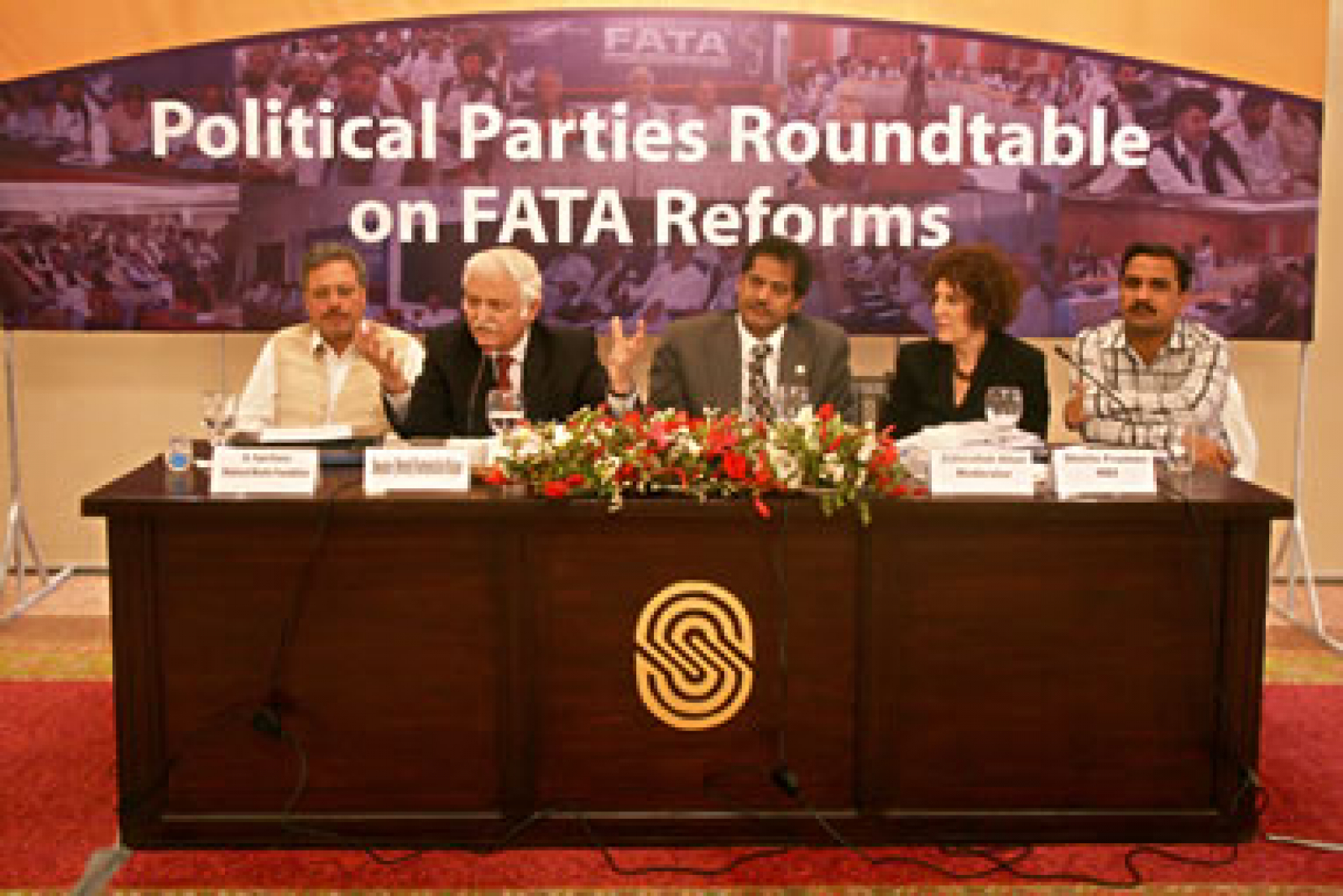
SHARE
Representatives of seven major political parties agreed that reforms to democratize the Federally Administered Tribal Areas (FATA) are key to resolving problems in the troubled tribal areas.
At a roundtable here for political parties organized by the National Democratic Institute (NDI), representatives from the Pakistan Peoples Party (PPP), Pakistan Muslim League-Nawaz (PML-N), Awami National Party (ANP), Jamaat-e-Islami (JI), Pakhtunkhwa Mili Awami Party (PKMAP), Pakistan Muslim League – Q (PML-Q) and National Party (NP) debated the pros and cons of various political reforms but unanimously shared the view that there is an urgent need to democratize FATA to ensure that tribal people enjoy the same human and political rights as the rest of the country.
The spokesperson for the president of Pakistan and the PPP, Farhatullah Babar, revealed that the government is poised to announce reforms that would remove the harsh provisions of the Frontier Crimes Regulation (FCR). While acknowledging that some would like to see the FCR abolished altogether, he warned that abolition would create a dangerous void and that reforms are the first step for a smooth transition to the provision of full rights. The spokesperson added that the government is also considering extending the Political Parties Act to FATA, which was unanimously supported by the parties at the roundtable. Regarding the constitutional status of FATA, the spokesperson was of the opinion that the people of FATA should be given a choice whether to join North West Frontier Province (NWFP) or remain a separate entity and that any decision on status should be made only after consultation with all the stakeholders. In an appeal to the parties for consensus on reforms, he asserted that no party can single-handedly deal with the problems in the region.
Abdul Latif Afridi, ANP vice president for FATA and president of the Peshawar High Court Bar Association, while briefing the participants about his party’s FATA policy, said that they are opposed to the idea of a referendum on constitutional status due to the bad experience of past such endeavors, Instead, he said, ANP wants to convert FATA into a Provincially Administered Tribal Area (PATA), which would give the people of FATA representation in the provincial assembly. He also mentioned that ANP has provided its input on amendments to the FCR and now the ball is in the government’s court to make a decision. Commenting on the present administration in FATA, he underscored the rampant corruption and called for an immediate change.
Professor Mohammed Ibrahim Khan from JI insisted the FCR be annulled. He further said that peace cannot be restored in FATA until there is peace in Afghanistan and to that end, he argued, negotiation must take place with the Taliban.
Taking a different view, the president of the National Party, Senator Dr. Abdul Malik, charged that FATA has been converted into a nursery of Jihadis with the idea of making Afghanistan the fifth province of Pakistan. Condemning such action he declared that NP believes that talibanization should be stopped and FATA should be made part of NWFP.
Senator Abdul Rahim Mandukhail of PKMAP said there is no need to change the status of FATA. He stressed that the Jirga System needs to be strengthened and empowered through democratic means and that any changes to FCR should be in accordance with the culture of FATA.
Nuzhat Sadiq of PML-N and Malik Zahir Shah Afridi of PML-Q stressed the need for economic uplift of FATA as a means to achieve peace and stability. They also highlighted the lack of education, health facilities and economic empowerment of FATA people.
The roundtable began with a presentation by Dr. Syed Kamal, president of the Shaheed Bhutto Foundation, on recommendations developed by over 300 tribal residents at a series of roundtable discussions held in recent months. The recommendations called for the mainstreaming of FATA with the rest of the country through a series of reforms that would bring more democratic, representative government, a fair judicial system, transparent and accountable decision-making on development initiatives and an end to administrative corruption.
NDI Country Director Sheila Fruman in her remarks said that the problems in FATA are well known and it is up to political parties to offer citizens a clear choice on how to resolve them, taking into account the wishes of tribal residents who are calling for democratic political reforms that would give them equal human and political rights through the same system of democratic governance as the rest of the federation.
–
Released on April 2, 2009


